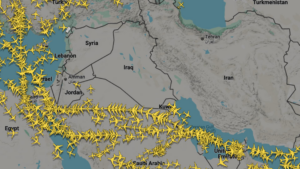Airlines Grounded: Understanding the Impact of Recent Turmoil in the Middle East
In a dramatic escalation of military tensions, airlines around the globe have been forced to reevaluate their flight paths following Israel’s recent missile strikes on Iran. This unforeseen military action has triggered a series of cancellations and reroutes, affecting travelers and air traffic alike. At Extreme Investor Network, we dive deeper into the implications of this developing situation and provide insights to help investors and travelers navigate this turbulent period.
Flights Canceled and Airspace Closed
On June 13, 2025, Israel’s offensive prompted major airlines like Delta and United Airlines to cancel flights to Tel Aviv through at least Saturday. Both carriers diverted flights headed for Israel back over the Atlantic, which showcases the immediate repercussions of such geopolitical events. United’s proactive response included placing 26 crew members who were caught in Israel on El Al, the local airline, to facilitate their return to the U.S.
El Al itself has suspended all operations, mirroring a wider trend across the region. According to their website, they are not accepting new bookings until the end of June, advising customers to arrange accommodation abroad until there’s a change in security directives.
Broader Ripples in the Aviation Industry
The fallout isn’t limited to Israeli airspace. Airlines like Turkish Airlines and Wizz Air have halted their services to Israel, while Lufthansa has suspended not only its Tel Aviv routes but also its services to Tehran, with cancellations extending until July 31 for certain locations. Emirates has also announced the suspension of its flights to regions including Iraq, Jordan, Lebanon, and Iran.
This pattern signals a significant shift in international air travel dynamics, as airlines scramble to adapt to heightened geopolitical risks. Travelers must now contend with more extended and costly routes as airlines eliminate the risks associated with conflict zones.
Adaptive Strategies for Travelers and Investors
Given the evolving situation, here are a few strategies for both travelers and investors to consider:
-
Travel Flexibility: If you’re planning to fly to or through the Middle East, monitor your airline’s communications closely. Many airlines are offering travel vouchers and waiving change fees for affected customers, giving you the option to reschedule without financial penalties.
-
Alternative Routes: Explore alternative destinations or routes that avoid conflict areas. Consider traveling to nearby countries that may not be affected by the conflict for your planned vacation or business trip.
-
Investment Insights: For investors, the current turmoil presents a dual-edged sword. While the immediate impact on airlines may appear negative, it may create opportunities in sectors that provide security solutions or alternative travel methods. Keeping an eye on market trends in aviation and defense could be advantageous.
- Stay Updated: Subscribe to news alerts or follow aviation news closely. As the situation develops, understanding when airspace may reopen or when hostilities may escalate will be critical in making informed travel and investment decisions.
Conclusion
The recent escalation in military conflict in the Middle East, particularly between Israel and Iran, has significant ramifications for the aviation industry and travelers alike. At Extreme Investor Network, we are committed to bringing you timely, relevant information to help you navigate these challenges. By taking proactive steps and remaining informed, you can minimize disruptions and seize potential opportunities during these uncertain times.
Stay connected with us for the latest updates and expert analysis on how global events impact markets and travel.

